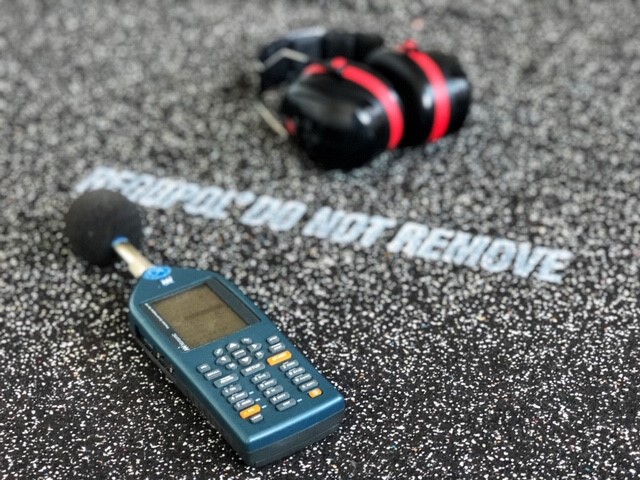
Sound Insulation Testing – Common Questions & Answers.
Sound Insulation Testing – Common Questions & Answers.
To try and help our clients better understand Sound Insulation Testing for Approved Documents E, we have collated the most common and questions (along with answers) clients have asked us over the last ten years. If you have further questions not contained within this article then please don’t hesitate to contact us.
What is Sound Insulation Testing?
Sound insulation is the property of a wall and /or dividing partition to resist the passage of noise. The sound Insulation testing is a method of quantifying the sound insulation performance of walls and/or floors. Sound Insulation testing can be carried out on party walls, party floors or facades of any building.

Do I need sound insulation testing on my Property?
One of the largest single reasons for disputes between neighbours
is noise complaints. Approved Document Part
E – Resistance to the passage of sound describes minimum standards
to be achieved by newly built domestic dwellings.
What is Approved Document E?
Approved Document Part E of the Building Regulations, sets out minimum standards for sound insulation performance to be achieved by party wall and party floors, you can achieve compliance with Part E by undertaking Pre-Completion Sound Testing
When is the Sound Testing carried out?
The Sound Insulation
Testing is carried out when the buildings are
complete. Windows should be in place with any vents closable. Internal and
external doors should be in place, along with skirting, cornicing and plug
sockets in place. Sound testing must be carried out before any soft coverings such
as carpet have been laid to the floors. No furniture – such as beds or settees
should be in the rooms during the sound testing as it will have an effect on
the results.
Are internal partitions within a single dwelling sound tested?
No, Laboratory test based performance standards (Rw) exist for certain internal
walls and floors, but they are not intended to be verified as-built by on site
measurement and therefore sound insulation testing is not a
requirement; however, approved document E does state that internal partitions
should achieve 40dB.
Do detached properties require sound testing for Part E of
Building Regulations?
No, only attached properties require sound tests such as semi-detached
dwellings or blocks of flats. Detached properties share no common partitions
with any other properties.
How many sound insulation tests should I need on my Project?
Approved Document E states that one set of sound tests is required for every 10 units in a group or sub-group. A group or sub-group is defined where significant differences in construction or layout occur, for instance:
For a pair of semi-detached Houses – a set of tests would usually comprise two airborne sound insulation tests of a separating wall.
- For Flats (up to 10 units) – a six pack would normally be required, this comprises of: two airborne wall tests, two airborne floor tests and two impact floor sound tests.
- For Rooms for Residential Purposes (student accommodation, hotel rooms, care homes etc.) – a set of tests would usually comprise: one airborne sound insulation tests of a separating wall; one airborne sound insulation test of a separating floor; one impact sound transmission test of a separating floor.
Which plots selected for sound testing?
We usually specify the amount of sound insulation tests that is required
on each project and this will be shown on a schedule within our fee proposal.
This allows our clients to forward the schedule to building control to seek
their approval prior to the test. We first look at the floor plans then work out
a testing schedule taking into account testing through the projects ‘habitable
rooms’ i.e. lounges & bedrooms where possible. When we have specified the
sound testing schedule it should always be checked by building control and/or
the client to seek their approval before the commencement of sound insulation testing.
How do I Prepare my Site for Sound Insulation Testing?
APT Sound Testing always send out a sound testing checklist along with our fee proposals to help you prepare for the sound testing, as we always want our clients to be fully prepared so they can pass their sound testing at the first attempt.
How long will the sound testing take?
The time taken to undertake the sound insulation testing varies with site conditions, but generally a ‘6 pack’ set of tests on houses and flats takes about one to two hours. Obviously this depends on the site being fully prepared in line with our sound testing checklist.
Will
the sound insulation testing disrupt work on site?
we
require relatively quiet conditions are needed to take accurate measurements.
This means that anyone working in the testing area will have to leave
temporarily and any noisy works in the vicinity of the test rooms will need to
be halted i.e. using power tools or loud hammering etc.
How do I know if I’m ready for a sound insulation test?
We send out a checklist with all quotations to allow our clients to check they
are ready for the sound
testing. Basically the plots should be at least at
second fix stage – for further details please refer to our sound test checklist.
What sound testing equipment do you use?
We use the latest UKAS calibrated acoustic equipment, for ease of use and reliability. unlike many other companies we able inform clients if they have passed or failed straightaway whilst on site. This allows us to offer acoustic advice and collect detailed construction information whilst on site, in the event of wall and/or floors failing the sound testing.
What if I only have 110V and not 240V on site?
Unfortunately we cannot undertake the testing off 110V or localised generator power; we will need 240V to undertake the sound testing.
Should I inform my neighbours of the impending sound testing?
If the building is attached in any way to occupied properties then you will
need to inform the neighbours. We need to gain access to the neighbouring
properties to undertake the sound test as we test the wall
partition. You will also need to ensure that access is provided to the neighbouring
properties throughout the sound testing.
Can you offer acoustic advice to help me to
pass my sound testing?
APT offer an acoustic design service to help
you design your buildings partitions to pass Part E sound testing. If you send
through the relevant drawings such as sections and floor plans during the design
stages of the project, we can check the design to see if there are any
junctions or details where ‘noise flanking’ may occur, we can then advise if
any changes are required to lower the chance of sound test failures.
Rest Assured
We believe in working with our clients on all types of projects from small end of terrace developments up to large blocks of flats. We believe that by being involved at the beginning of a project we can often save our clients expensive and difficult remedial works at the completion stage of a project.
If you need sound insulation testing for your current project, please call our team on 01525 303905 or email info@aptsoundtesting.co.uk We can provide you with expert advice and are happy to offer a free, no obligation quote along with our informative
checklist to help you prepare for the sound testing.